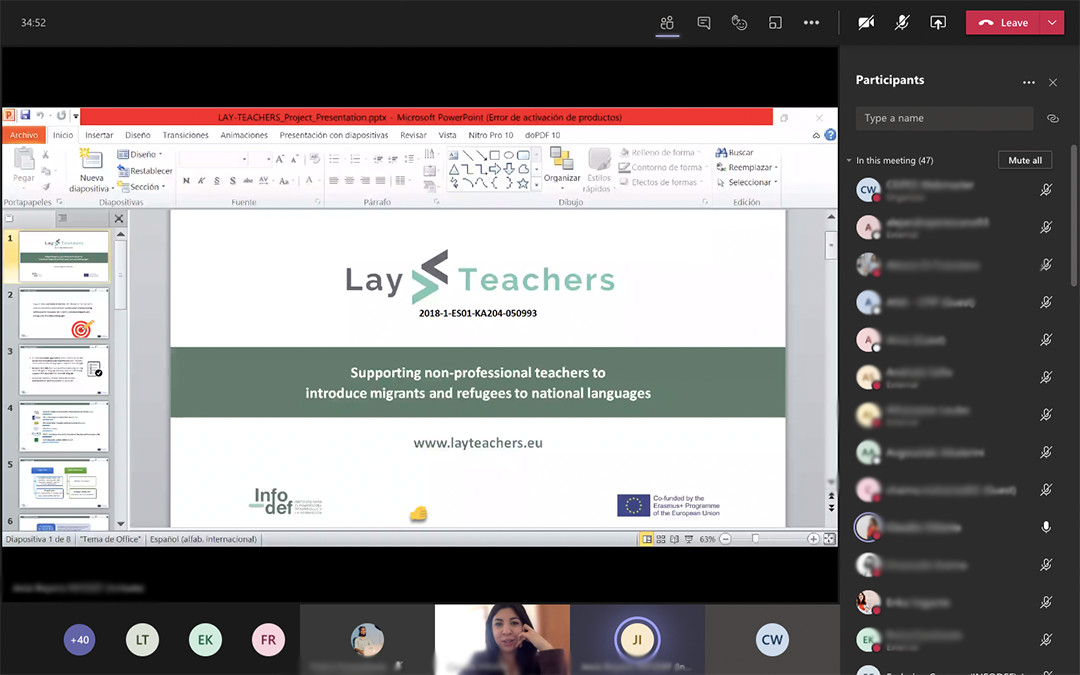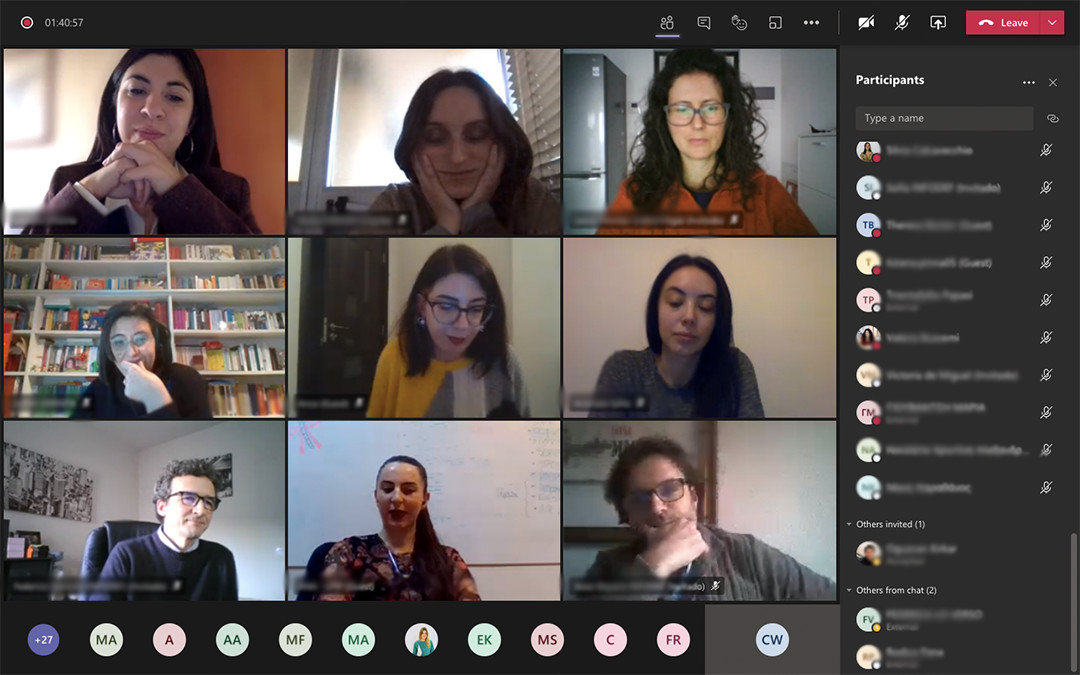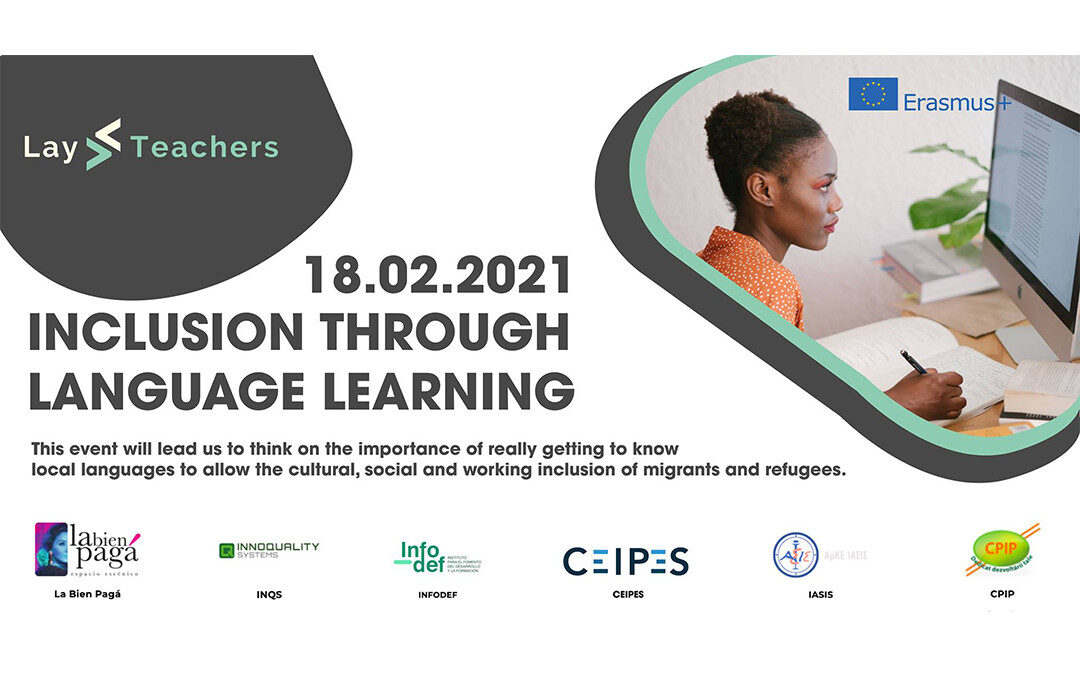Project Lay Teachers – supporting non professional teachers to introduce migrants and refugees to national languages – which worked for two years to provide innovative methodologies to support non professional teachers, mediators and educators who work every day in order to improve the language skills of migrants, refugees and asylum seekers, ended in February.
The Lay Teachers project (2018-1-ES01-KA204-050993) is funded by the Erasmus+ program, Key Action 2 (Strategic Partnership for Innovation and Exchange of good practices) and organized by a Consortium of Partners from 5 different European countries: INFODEF (Instituto para el fomento del desarollo y la formacion, coordinator) and LBP (Asociacion La bien Paga Espacio escenico) from Spain; CPIP (Centrul Pentru promovarea invatarii permanente Timisoara Asociatia) from Romania and IASIS from Greece.
The project ended on February 18, 2021 with the final event organized, unfortunately only online due to the pandemic situation we are experiencing, just by CEIPES. The event entitled “INCLUSION THROUGH LANGUAGE LEARNING” was a moment not only of presentation of the project and its results, but especially of sharing in which it was highlighted the importance of the knowledge of the national language as a means of integration for each person with a migrant background.
The agenda was very busy and the participation was high. The event, in fact, was held in English, a language common to all countries in the world, to allow the participation not only of all the partners of the project consortium but also of people from countries other than Italy.
The event opened with a presentation of CEIPES and the project partners.
Then, Dr. Jesus Boyano, researcher and professor of education and social work at the University of Valladolid (Spain), head of the department of international projects at INFODEF, presented the project and the results that we have achieved.
Subsequently, the 3 intellectual outputs of the project were presented respectively by Dr. Laura Trevisan, project manager at Asociacion La bien Paga Espacio escenico, Dr. Federico Campos, project manager at INFODED (coordinating partner of the project) and Dr. Ana Tanase from CPIP organization.
The central discussion of the event saw the intervention of Professor Luisa Amenta, Associate Professor at the University of Palermo, in the Humanities Department. Her speech brought to light Don Milani’s legacy in the plurilingual school “Because it is only language that makes us equal”, focusing the discussion on the idea that knowledge of language is a fundamental element to achieve equality among all men.
The event continued with the presentation of a local good practice in Palermo, of ITASTRA by Professor Giulia Calandra. ITASTRA is the Italian language school (ITA) for foreigners (STRA) that creates innovative teaching and learning approaches in order to make its students live a path of integration that is not only linguistic but also cultural.
After having received several questions for Professors Amenta and Calandra, the event ended with the last speech of the day, scheduled in the agenda, by Psychologist Marianina Anagnostopoulou, project manager of IASIS (Greek partner of the project) who spoke about how the project activities have been implemented in Greece and the results obtained in her country.
It was undoubtedly an interesting and very stimulating event that underlined the importance of the local language, especially the teaching of it. Integration starts, in fact, from a knowledge first of the language, and then also of the culture of the host country.
The CEIPES takes, further, the opportunity to thank all the participants who have, without a doubt, with enthusiasm, enriched the event, with the hope of being able to meet one day and return to organize our events in presence.
It was a great honor for CEIPES to participate in the project Erasmus+ Lay teachers – supporting non professional teachers to introduce migrants and refugees to national languages, with the collaboration of a proactive, very strong Consortium, able to find solutions to the problems that have arisen this pandemic.
If you are interested, feel free to have a look and subscribe to the project platform. In addition to the information and results of the project, you will also find: a pdf manual (downloadable) for non-professional teachers on introducing the national language to migrants and refugees; a network hub for all adult education providers.
In addition, by signing up (free) to the platform, you will have access to:
- A digital database as well as a collection of innovative best practices;
- A document that provides cutting-edge theoretical and pedagogical approaches to supporting lay teachers;
- A B-learning (blended learning) course;
- A set of hands-on activities that you can do with your students.
An additional document has been also added to these activities, repurposing them from practical to online.


